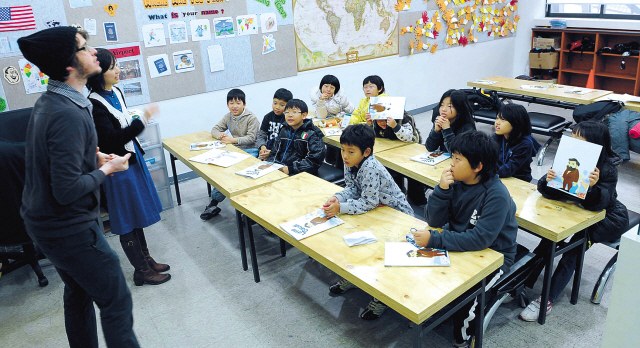The Education Ministry said last month it was considering banning foreign nationals from working at private preschool academies, but the plan has been hit by doubts about its plausibility before even taking off.
The ministry claimed that not having native speakers in private institutes ― known here as hagwon ― would considerably reduce the amount parents spend on English private education.
“The costs of hagwon hiring foreigners is way too high. Our preliminary research indicates that the cost of hiring a foreigner is about 1.5 times that of hiring Koreans under the exact same working conditions” a ministry official said. He said this could be done by not issuing work visas to foreign nationals entering Korea to work at preschool hagwon.
“It is still a work-in-progress. Details include whether or not it will apply to foreigners of Korean descent, whether or not to ban those already in Korea (from working at those hagwon) and whether to grant a grace period or implement it right away,” he said.
The official reiterated that the plan was still in an early stage, and there was a possibility that the entire scheme would be scrapped. But it drew a fierce reaction from those in the private education industry.
“Banning foreign teachers from being hired (at private institutes) is a plan potentially in violation of people’s constitutional right to receive education. It can also cause diplomatic issues, since it limits foreign nationals’ right to work in Korea,” the Korea Association of Hakwons said in a press conference last week.
The association claimed that the increase in the number of native English teachers helped reduce the number of younger students going abroad to study English. The amount of money spent on studying abroad increased from 431.3 billion won ($396 million) in 2007 to 522.7 billion won in 2012, but the figure decreased for elementary school students.
The group also quoted a 2011 survey by Korea Institute of Child Care and Education that showed about 60.7 percent of parents wanted English education for their children in the preschool stage.
Whether the ministry measure will be effective in driving down the costs of private education remains to be seen.
The average monthly cost of employing a native speaker in major private institutes usually hovers a little above 3 million won including housing and other expenses, according to industry sources. They said it generally costs more to hire a native speaker than a Korean to teach English, but claimed the difference is not jaw-dropping.
 |
Members of the Korea Association of Hakwons, a group of local private institutes, speak during a press conference on Dec. 23 in Seoul. (Yonhap) |
“On average, the costs of English private institutes or English kindergartens are not as high as people think,” said Kim Eun-sook, an official at YBM Education, a local private institute. She said the fees for public kindergartens average about 1.34 million won, which is actually higher than English hagwon.
“Hagwons are monitored (by the association) based on how much we charge the parents. We have a ceiling on how much we can pay the foreign teachers, so this talk about reducing costs makes little sense,” Kim said.
The measure also sparked outrage from foreign workers here, who saw the news as another door being slammed shut in their face. Public schools have seen significant reductions in NET staff in the past three years. According to Rep. Yoon Jae-ok of the ruling Saenuri Party, the percentage of schools with native English-speaking teachers dropped from over 85.7 percent in 2011 to 48.6 percent in 2014.
Last year, Incheon’s education office said it had canceled hiring new native English teachers due to budget restraints. The Seoul education office is also planning to cut its budget for native teachers for this year, saying their effectiveness has been “unproven.”
“I can understand why the government would try to cut down spending on private education, but this is ridiculous. Why can’t they just put a cap on how much hagwon charge?” said an American who used to teach at a school in Incheon. “How would specifically targeting non-Korean workers help? The only possible thing I can think of is maybe it can help more Koreans get jobs.”
 |
Elementary school students attend a class taught by a native English teacher. This photo is not directly related to the story. (Korea Herald file photo) |
The effectiveness of early-stage English education is an ongoing debate, but the bigger issue for the governmental measure is that it failed to win support even from activists working to reduce the country’s reliance on private education.
Lee Seul-gi, an official at the civic group World Without Worries About Private Education, said banning foreign teachers from preschool private education was hardly a fundamental solution.
“I think English hagwon for children need to be regulated in some way, but just getting rid of foreign teachers is hardly the answer,” Lee said. “Realistically speaking I’m not sure if it’s even doable, since it can be seen as discrimination against foreigners.”
The group has already released a statement bashing the government’s plan to reduce private education as “hastily put together,” slapping a big “F” grade on it. “Despite being the first comprehensive plan (on private education) under President Park Geun-hye’s administration, it doesn’t have any sections that are expected to have any real effect,” Lee said.
She added that foreign teachers were hardly the main problem presented by English hagwon. These institutes often place immense stress on children, forcing them to do six or seven hours of work each day.
Lee said the Education Ministry first needs to persuade parents that it was not absolutely critical for children to learn English early on in their lives. Rather than just banning foreign teachers from private institutes, the government needs to conduct research on the effectiveness of early-stage English education, she said.
By Yoon Min-sik (
minsikyoon@heraldcorp.com)









